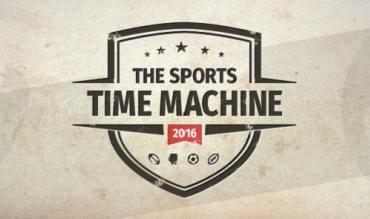There's just something so romantic about the underdog winning isn’t there? The history of sport has thrown up some almighty upsets over the years, crowning the most unsuspecting of champions and seeing the unfancied beating the odds-on favourites.
This year, it’s the turn of Leicester City. In February 2015, the Foxes were staring down the barrel of relegation from the Premier League as they sat in 20th place. Fast forward a year and it's a completely different story. City managed to stay up and, after an unbelievable campaign thus far, now sit at the top of the league. Imagine backing Leicester this time last year to win the 2015/16 Premier League? The odds will have been out of this world. If they manage to pull it off and claim the title, it will the epitome of a gamer striking it big at the casino – a once in a lifetime event.
To embrace the spirit of the underdog, we've hopped in our sports time machine and taken a look back at some of the biggest upsets ever recorded.
DOUGLAS CONQUERS IRON MIKE, February 11th 1990
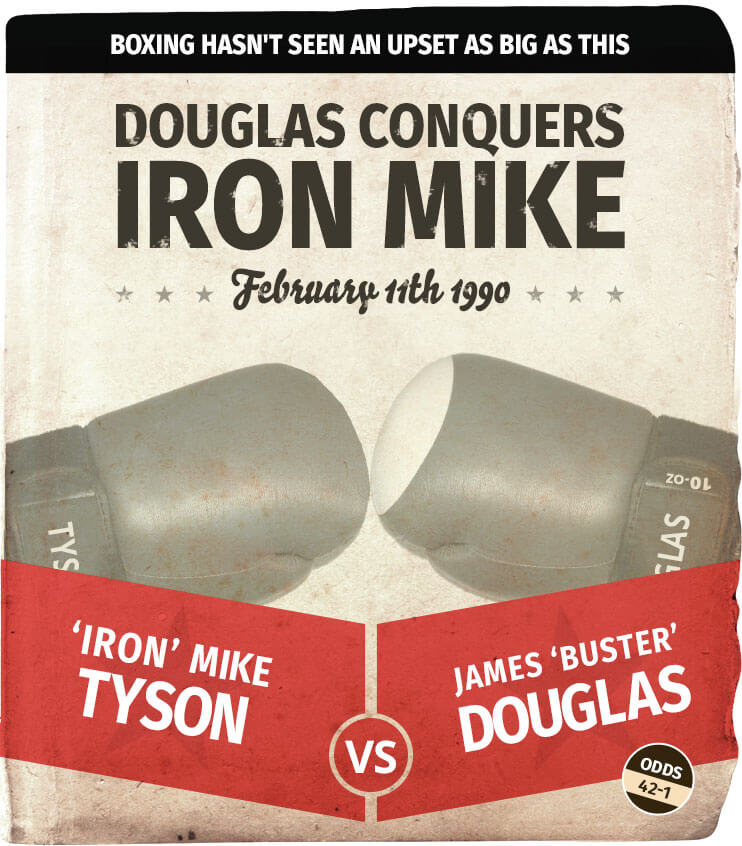
As the 1980s became the 1990s, Mike Tyson aka 'the Baddest Man on the Planet' was the fighter to beat in world boxing. Standing at 5'10, many sports critics doubted Tyson's true potential when he first burst onto the scene in 1985 due to his diminutive stature compared to his fellow heavyweights – but by the turn of the decade, Iron Mike’s record stood at an undefeated 37- 0. He held the four major world title belts and seemed the heir apparent to Mohammed Ali's throne as the King of Boxing. Tyson proved everyone wrong.
After his ruthless annihilation of Carl Williams in his previous bout (a first round knock-out, thanks to a flurry of counter punches after avoiding his opponent’s jab), it looked like no-one could stop Tyson. But when you're the champ you have to defend your gold, and Tyson's next encounter in the ring would be against fellow American James "Buster" Douglas. Douglas was a respected figure in the sport with a decent record of 30 wins from 35 fights, but he seemed massively out of Iron Mike's league. After dominating the heavyweight division through the late 1980s (he'd not been taken past the fifth round in three years), it looked like Tyson's reign of aggressive boxing was set to continue into the new decade.
So Douglas's date with destructive destiny was set – February 11th 1990, at the Tokyo Dome in Japan.
It's safe to say no one fancied Buster's chances. The bookmakers were so convinced of a Tyson victory, the majority weren't even taking bets on the fight – they didn't want to pay out on a Tyson victory and felt there was more chance of getting blood out of a stone than Douglas becoming champ. Even Las Vegas, the iconic gambling city, didn't fancy a piece of the action, with the Mirage being the Strip's only casino offering odds of a Douglas win as a 42-1 shot.
Even with his WBC, WBA, IBF and The Ring heavyweight titles on the line, Tyson wasn't worried, claiming recently that he ‘didn’t consider Buster Douglas much of a challenge’. Iron Mike barely trained for the fight, barring a few sparring sessions with his trainer Greg Page, and had become far more interested in the bright lights and debauchery found outside the sport. Much to promoter Don King's dismay, Tyson arrived in Japan 30 pounds overweight, yet he was never in doubt of his client scoring another victory.
From the first round bell, however, there could only be one winner. Douglas was sharp out of the block, terrorising Tyson with flurries of jabs and swinging his fists like no one before him had – he'd called the champ out for a fight, and was beating him. Tyson was taking so much punishment he could barely see out of his right eye, swollen thanks to the sweetest of hooks from Douglas.
But, in the eighth, it looked like order had been restored, as Tyson floored his opponent with a huge right. To this day, there is much debate over the 10-count, but Buster somehow used all his strength and got back to his feet – a turning point in the bout. Tyson knew his best wasn't good enough, he knew he was under-prepared.
The tenth round signalled the end – Tyson knew he needed to go for the knockout, swinging like a wild man. But Douglas stayed cool, hitting the champ with an almighty uppercut that left Tyson reeling. Four punches later and Tyson was on the canvas for the first time in his career. His gum shield was left dangling out his mouth as he tried to stumble back to his feet, as referee Octavio Meyran's count hit 10. Douglas had done it. He'd beaten the world champion. The Baddest Man on the Planet. Iron Mike Tyson.
Boxing hasn't seen an upset as big as this since – a 42-1 outsider beating the World Champions, it’s the stuff of fairy tales.
THE HOME OF FOOTBALL LOSING TO THE HOME OF SOCCER, June 29th 1950
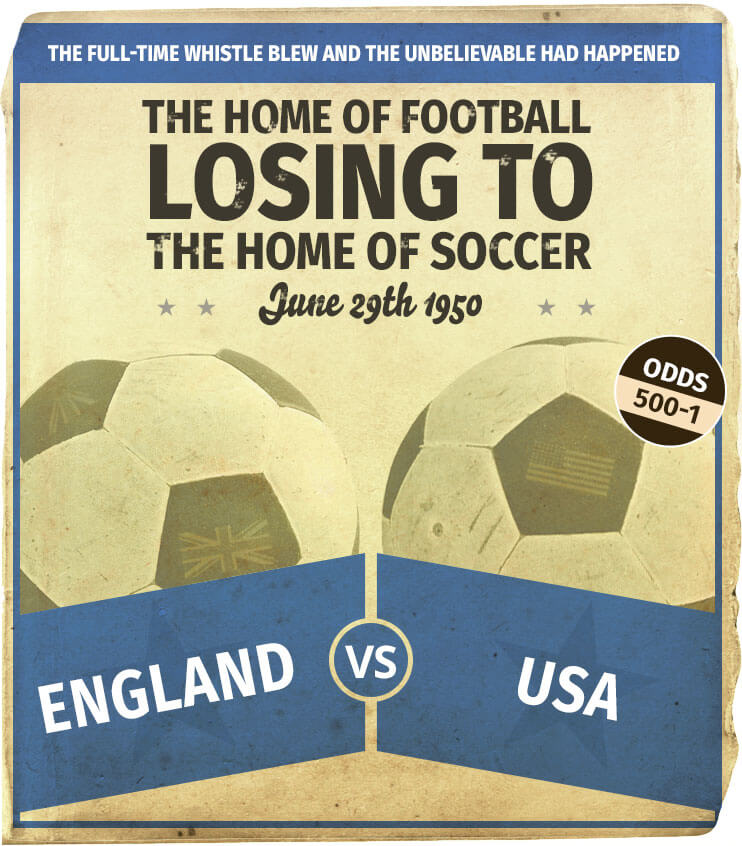
Although the United States has now embraced "soccer fever" – thanks to the fine array of talent playing their Major League Soccer, and the country's valiant effort at the 2014 FIFA World Cup in Brazil – it hasn’t always been that way.
Back in 1950, the USA was a country famed for its love of baseball and boxing, whilst American football was beginning to find its feet as a popular sport too. But 'soccer' never really took off, so much so that the USA took a roster of semi-professionals to an international, and highly prestigious, tournament – their team consisted of teachers, mailmen and even a hearse driver. The squad only managed one training session before leaving, which was on the day of departure to Brazil, so as you can imagine, their preparation was hardly ideal.
After losing their opening game 3-1 to Spain in Curitiba, the USA's task wouldn’t get easier – next up they had to play the mighty Three Lions, England. After 23 wins in 30 games, England were described as the "Kings of Football" during the post-war period and had some of the world’s finest footballing talent within their ranks. Billy Wright, Tom Finney and Stan Mortensen all lined up for Walter Winterbottom's team, which could even afford to leave the iconic Stanley Matthews in the reserves after he arrived late due to injury.
Before the tournament began, England were the favourites to lift the trophy with odds as short as 3-1 – it would have taken a brave gambler to back the States for World Cup glory, whereas bookmakers placing them as long as 500-1 just to beat England, let alone win the whole thing!
So little were their chances fancied that even Bill Jeffrey, the USA's team coach, felt his players were "sheep ready for the slaughter" - and who would have blamed him, coming up against – arguably – the world's best team?
As you’d imagine, the game started off and there was only one team in it – England. Attack after attack pummelled the American defence, but the Scotsman Jeffrey had his team well-organised and they resiliently weathered the storm.
But in the 37th minute, the game was changed.
US half-back Walter Bahr picked up the ball from 30 yards out and decided to test England's Bert Williams. It seemed a simple enough save for the goalkeeper to make – but enter Joe Gaetjens. The dish-washing semi-pro footballer flung himself onto the end of the shot, got a head on it and guided the ball into the goal, beating Williams all ends up.
USA 1 – 0 England. A score no-one would have ever dreamed of seeing.
But with 57 minutes to get an equaliser, and to then put the USA back in their place with a flurry of goals, England were still the favourites. As the history books show, though, it wasn't meant to be.
Heroics from the USA goalkeeper Frank Borghi stopped the onslaught from Finney and co – and the underdogs even had the chance to score a second in the dying minutes, only to be denied by a sliding clearance by Alf Ramsey on the goal line.
The full-time whistle blew and the unbelievable had happened, Billy Jeffrey's team of part-timers had beat the great post-war England at their own sport.
BRADY'S PATRIOTS STUNNED BY THE GIANTS, February 3 rd 2008
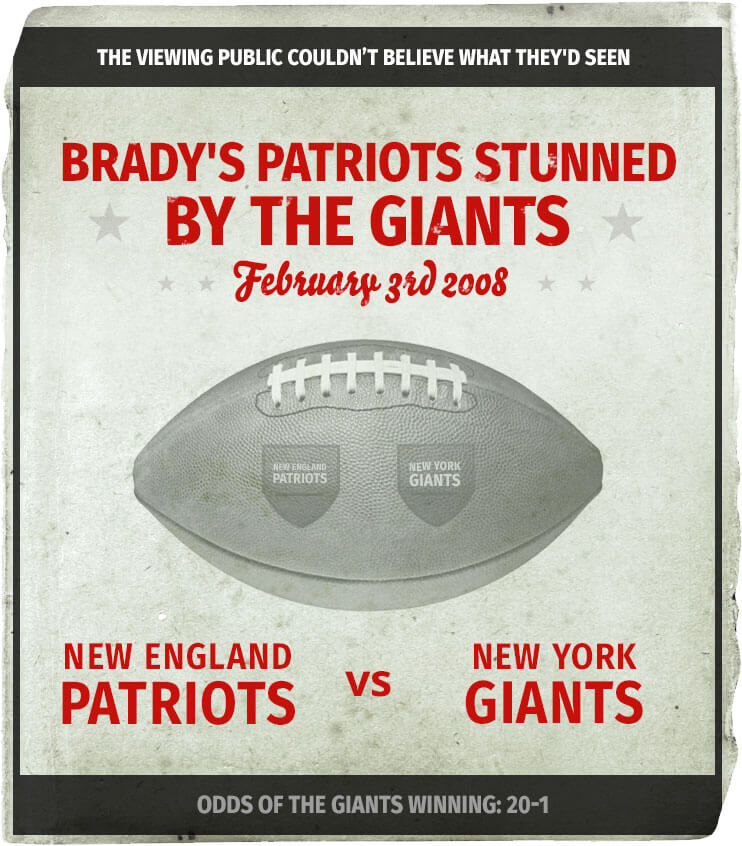
Eight years ago saw one of the best organised, quality teams ever to play in the NFL – the New England Patriots. Led by the sport's poster boy Tom Brady, the Pats were on the cusp of the perfect season – going through the entire campaign unbeaten with a record of 19-0. Brady himself had picked up the league's Most Valuable Player award and the Pats looked set to write their name in the history books as the NFL's greatest team by clinching Super Bowl XLII and completing a full season undefeated – something only achieved by the Miami Dolphins back in 1972. But the New York Giants had other ideas.
In true underdog style, the Giants had unexpectedly made the final, working their way through the NFC division and the play-offs with pluck, grit and determination. After a difficult start to the season, Eli Manning had helped the Giants to tick over all season, dictating team tactics and plays from Quarterback to allow his teammates to latch onto his throws and win matches. He was formidable during the play-offs, clawing the Giants past teams arguably much better than them and all the way to the Super Bowl in Phoenix, Arizona. Manning was good – but he was no Brady.
February 3rd 2008 was the Patriots’ date with destiny – could they win their fifth Vince Lombardi trophy since 2001? All the pressure was on them, not the New York Giants.
The game played out as expected over the first three quarters, as the Patriots took it the clash by the scruff of its neck and dominated the play. Despite the Giants' robust defence, the score stood at 14-10 to New England with just over two minutes left to play. Brady and co knew that if they could hold out 120 seconds, they would be propelled to new dizzy heights of legendary status. No one would have predicted what was to happen.
The Giants sat deep in their own territory with the clock ticking, and Eli Manning conjured up a string of plays that dreams are made of. Just like the wise blackjack player in the casino, he kept his cards close to his chest, but his tactics were spot on. Orchestrating from Quarterback, Manning drove the Giants forward, using all his skills and tactical nous to break down the Pats’ defence. With 35 seconds remaining on the clock, Manning receives the ball from the ruck and throws as good a pass as he will ever throw again, flying 13 yards through the air and perfectly into the hands of New York's Plaxico Burress, who landed for a touchdown. The Giants had clawed back 14 points in the final quarter, and now led the match 17-14.
The determination of the Giants was evident as, with 20 seconds still remaining, Jay Alford broke through the Pats’ blockers and sacked Tom Brady onto his back as he tried to pick out a pass – a game-winning tackle.
The Giants held out for the final few seconds and won the match. Manning won the game's MVP for a Brady-esque performance and the viewing public couldn’t believe what they'd seen. The Giants had defeated the undefeated Pats.
LAST GASP JAPAN TOPPLE THE MIGHTY SPRINGBOKS – September 19th 2015
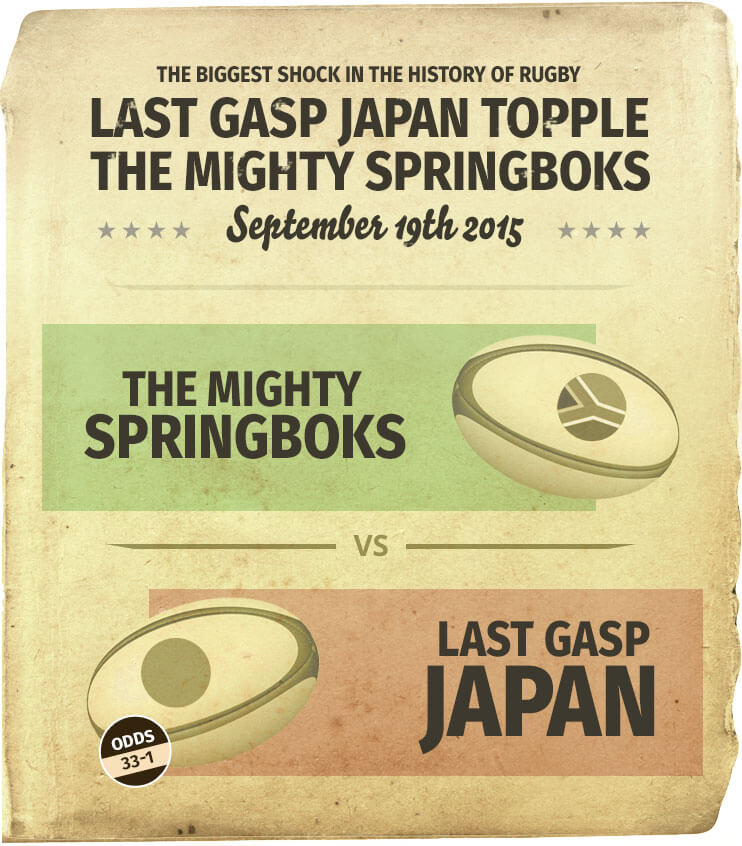
Even if you don’t know anything about rugby union, you'll know this – South Africa are a much better team than Japan.
The two-time World Cup winners went into the 2015 tournament as one of the frontrunners to lift the crown once again, with many looking forward to the prospect of the Springboks facing Southern Hemisphere counterparts New Zealand and Australia in the latter stages of the competition.
Not only that, but the South Africans had been drawn in a very favourable group alongside the USA, Scotland, Samoa – and Japan. It was a given that they would walk the group, teaching teams a lesson as they demolished Pool B.
The opening pool match saw South Africa pitted against Japan at Brighton's Community Stadium – 4th in the world against 14th and a game the Springboks were expected to comfortably win. What they weren't expecting, however, was to be thrown into battle and be part of the greatest rugby union upset of all time.
After a closely-fought first half, the Springboks found a bit of breathing space in the second half, thanks to tries from Lood de Jager and Adriaan Strauss. The Japanese weren't beaten though, and clawed it back to 29-29 with 10 minutes to play. Heartbreak was on the cards for Japan, even after their valiant efforts, after Handré Pollard coolly kicked a penalty to give South Africa a 32-29 lead with seven left.
No one was writing off Japan, especially with the highly regarded coach Eddie Jones at the helm. They huffed and puffed, constantly asking questions of the South African back line, keeping the ball alive as the klaxon sounded the end of 80 minutes – the game continues until the ball goes 'dead' in rugby union. With 84 minutes on the clock, the Springbok's resilience was broken and Karne Hesketh broke through and scored. Japan, the minnows who hadn't won a World Cup match since 1991, had beaten the mighty South Africa.
The Springboks may have held an inquest into how such a result could have happened, but for Japan they had sprung the biggest shock in the history of rugby.
Our trip back in time has proven that the underdog always stands a chance. So can the impossible dream become possible, will Leicester City defy all the odds and lift the Premier League crown come May? Backing the Foxes at the start of the season would have been like wagering on a single roulette number at the casino – a long shot. With only a handful of games remaining, this really could be the biggest upset of all time.
